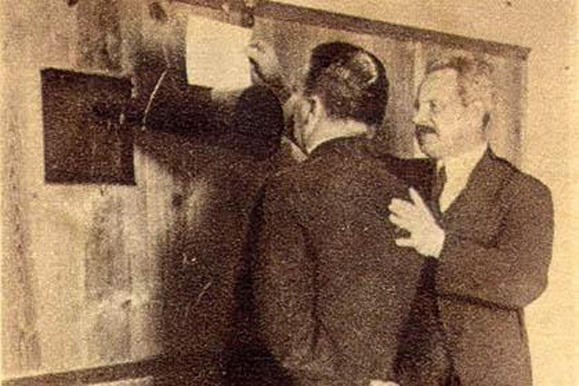The Doegen Records Project
In 1926, Berlin native Dr. Wilhelm Doegen, director of the sound department at the Prussian State Library, was asked by the Irish government to make a series of recordings of the Irish language in the Gaeltacht areas of Ireland and in the surrounding areas that had suffered a major decline in native Irish speaking. Doegen had a life long interest in linguistic and dialectical research, having visited over 70 POWs in WWI and recording over 250 languages and dialects, including 35 Irish speakers. In 1928, Doegen journeyed to Ireland with his assistant Karl Temple. They spent a week at University College Cork, recording men and women from counties Waterford, Tipperary, and east Cork, later moving to Mercy Convent in Killarney. Tempel returned later in 1930 and 31, recording in such places as University College Galway, Queens University Belfast, and the Courthouse in Letterkenny, Co. Donegal. The recordings were originally made on wax matrices and later converted to shellac. Of the 216 recordings, 4 broke in transit to Germany. The remaining full 212 records were given to the Royal Irish Academy and another set was split between University College Cork, University College Galway, and Queens University Belfast.
These recordings of Irish history, language, songs, and folktales are alive again thanks to the Doegen Records web project, which has released a set of recordings of native Irish speakers and dialects from over 17 counties in Ireland from the 1920s and 30s. Some of these dialects are now extinct in these regions, further adding to the importance of the Doegen recordings. The new website features over 400 tracks from the 212 surviving records that were recorded by Doegan and Temple from 1928-31. The project has been years in the making, beginning in 2007 with special funding from the Higher Education Authority to digitize the recordings. The completed website is something to truly marvel at, with access to the recordings as well as supplementary material detailing the location and background of the individuals.
Among the many recordings are songs, folk tales, parables of the prodigal son, prayers, and discourses. Listening to them, one gets chills from the humor, joy and sadness evoked in each person’s recitation. Leitrim native Anna Feely, aged “85-90” sings “A chailín deas na luachra,” a pastoral verse of a young man meeting a beautiful woman gathering rushes. Galway native Pádraig Ó Néill, aged 63, in a “clear musical voice” sings Tomás Bán Mac Aogáin, a popular Connacht song of doomed love between a rich man’s daughter and a poor man.
Alongside Feely and Ó Néill is Seán Ó Tuairisc a Catholic Galway man with“a clear strong voice,” reciting humorous folk tales like “An dochtúr óg agus an seandochtúr”(A Young Doctor and the Old Doctor), about the exploits of two country doctors. Cutting through the humor are personal stories of local history, such as where Ó Tuairisc describes in “Ag dul chun na cúirte i nDoire” a journey to Derry to attend court. He shares in great detail the history unfolding around him:
“Tháinig muid isteach. Agus nuair a chuaigh muid isteach chuaigh an turnae i dteach lóistín linn. Casadh cuid againn anonn ansin agus cuid againn anall. Ach nuair a chuaigh Ging, ar chuma ar bith, a chodladh san oíche, bhí an saol an-chorrach agus bhí urchair á gcaitheamh san áit chéanna. Bhí bu-… geaing mór saighdiúr taobh thiar agus málaí gainimh acub, déanta suas timpeall orthub. Bhí lorg na n-urchar ar an mballa sa teach a ndeachaigh Ging isteach ann. Nuair a chuaigh sé a chodladh san oíche bhí Seán Shéamais – chuir sé a chois amach as an leaba agus bhuail sé buille dhá chois faoin urlár. (But anyway, when Ging went to sleep in the night, the situation was very unstable and bullets were being fired in the same place. There was a big gang of soldiers out the back with sandbags built up around them. There were bullet marks on the house into which Ging went. When he went to sleep in the night John James put his foot out of the bed and he hit the floor with a bang of his foot).”
In all of these recordings a piece of the past is dusted off and transports the listener to a different time and place. For those with little or no fluency in the Irish language, translations in English can be found interspersed. Whether scholar or novice, you will be moved (and sometimes amused) by the words of the past.
Listen to the Doegen Records here: doegen.ie


Leave a Reply